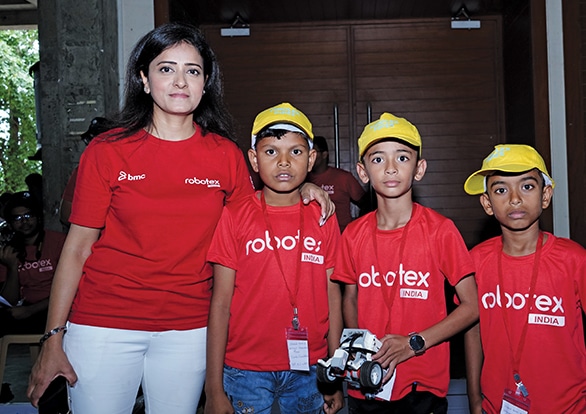Can corporate CSR funds truly make a difference? Rooted in the belief that technical skills should be accessible to all, Estonia-based non-profit Robotex International, established 24 years ago, has empowered over a million children across seven states in India. EFY’s Yashasvini Razdan interviewed South Asia Head Robotex International and Director Robotex India, Payal Manan Rajpal, to uncover the secret behind their success.

Robotex International, with students
Q. Could you explain the different programmes you have got?
A. We have outlined three distinct programmes:
• Robotics for rural schools. This initiative targets imparting future skills, particularly in robotics, to schools in rural areas within the country.
• STEM robotics labs. This programme involves establishing STEM, Robotics, and AI labs in government schools. These labs provide students with access to cutting-edge technology and the equipment necessary to upskill for the modern world.
• Girls who build robots. The ‘Girls Who Build Robots’ programme promotes STEM education for girls, aiming to reduce dropout rates and empower them for STEM careers.
Q. What is the duration of these programmes?
A. We propose a three- to five-year programme duration, incorporating teacher training initiatives, and ultimately transitioning towards sustainability. The extended engagement period ensures that after the initial years, the educational institutions can effectively continue and manage the programme independently. Typically, our commitment to the same donor spans five years, fostering a long-term and impactful collaboration.
Q. How is this course integrated into the regular academic curriculum for school children?
A. The curriculum we have developed draws inspiration from Finland and is crafted by our team in Estonia. Despite Estonia’s small population of 1.5 million, the country boasts the highest number of unicorns per capita globally. We have tailored the curriculum to include AI, robotics, and other technical skills, aligning with formal education trends in India.
Our curriculum spans levels one to five, with two primary goals. First, students should create a capstone project in areas such as AI, coding, IoT, robotics, and cybersecurity. Second, the robots built should be eligible for participation in championships. We have achieved a milestone by having government school children participate in championships alongside their private school counterparts.
Q. How does the curriculum differ across the levels?
A. The curriculum is standardised across all levels, with Level One focusing on basic coding using platforms like Scratch on an open interface. Students learn to code the robot, engage in projects, and participate in championships at this level. The curriculum progresses as students advance through Scratch to Arduino, then C, C++ coding, Raspberry Pi, and various types of robots, such as line followers, Maze Solver, 3kg Robo Sumo, and 5kg Robo Sumo.
Q. What are the primary sources of funding for Robotex India?
A. In addition to CSR funding, there have been instances where we have received support from the municipal corporation for specific schools. In these cases, the municipal corporation has directly contributed financially.
Q. Who is Robotex India answerable to with respect to the programmes you run?
A. We maintain a transparent communication channel with the government by obtaining necessary permissions from local Zilla Parishads (ZPs) and municipal corporations to run our programmes. The government observes the positive impact through improved academic scores, increased attendance, and the achievements of children in various competitions. For our CSR partners, we ensure regular updates.
Q. How do you finalise the location of these Robotex labs?
A. The labs are established based on the discretion and preferences of CSR donors. Robotex has interventions in seven states, and the decision to initiate these projects in specific locations depends on the CSR donor’s preferences.
Q. Could you give us an idea about the capex and opex investment you make in each project/lab?
A. Managing capex and opex efficiently is crucial for sustained operations. In the first year of the lab, capex investment is substantial, mainly for acquiring kits, and the subsequent years see a reduced percentage as the initial setup is in place. Meanwhile, our opex experiences a moderate annual increase ranging from 2%-5%, covering factors like inflation, fuel prices, trainer travel, and salary hikes.
Q. What is the percentage of opex investment you put in every lab?
A. The flexibility in permissible expenses depends on various factors. But, typically, in a general model where the ratio is four students to one kit, the allocation of funds is roughly distributed as follows: 45% for capex, 10% for administrative purposes, and 40% for opex. This breakdown provides clarity on the allocation of resources, ensuring efficient financial management across different aspects of the programme.
Q. Who sources the technical equipment for these labs—the CSR donor or Robotex India?
A. We source the robotics lab equipment, such as laptops, soldering wires, and PCB kits, for the CSR donor, to benefit the students of the programme. We handle the entire setup of the robotics lab.
Q. Where are you acquiring all your products from?
A. We have recently expanded our sourcing strategy to include items from outside the country, particularly motors and sensors, due to their faster availability in certain international markets. We also continue to buy hardware from within the country through selected vendors and explore the open market for specific components such as Arduino UNOs, motors, wires, and complete kits. We source our equipment from a few websites and electronics markets.
Q. What does the recruitment process for trainers of these programmes look like?
A. There is limited availability of skilled robotics, STEM, and coding trainers willing to work in government schools with a non-profit organisation. Many trainers prefer higher-paying positions in private schools or institutions with well-equipped labs. We want candidates with genuine compassion for working with government schoolchildren. Our employees often have a background as past championship winners in coding and robotics or have been involved in robotics clubs. Those hired from the industry typically bring three or more years of experience in teaching such skills to children. We assess the trainers throughout the job based on real-time impact and reports generated. They monitor and influence the projects children undertake. With a minimum of 200 students, each school is supported by two to three trainers.
Q. Who takes up the responsibility of maintaining these labs?
A. In 99% of cases, the donor is expected to continue its support due to the continual enrollment of new classes each year. The corporate engagement with the school is likely to persist, and we plan to run the programme annually for the school. However, in situations where a corporate decides to discontinue its support, we actively seek another corporate partner to continue the programme. Fortunately, the worst-case scenario, where no one is willing to support, has not occurred to date. In such an eventuality, we can provide capacity building for the school to manage the programme independently.












